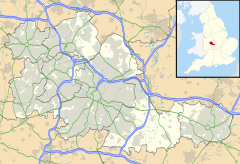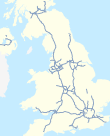Spaghetti Junction, Birmingham
| Gravelly Hill Interchange | |
|---|---|
| Spaghetti Junction | |
 Gravelly Hill Interchange from the south east | |
 | |
| Location | |
| Birmingham, England | |
| Coordinates | 52°30′40″N 1°51′58″W / 52.511°N 1.866°W |
| Roads at junction | |
| Construction | |
| Type | Free-flow interchange |
| Opened | 24 May 1972 |
| Maintained by | Highways England |
Gravelly Hill Interchange, also known as Spaghetti Junction,[1] is junction 6 of the M6 motorway where it meets the A38(M) Aston Expressway in the Gravelly Hill area of Birmingham, England. The interchange was opened on 24 May 1972.
Overview
The interchange's colloquial name "Spaghetti Junction" was coined in 1965 by journalists from the Birmingham Evening Mail. On 1 June 1965, reporter Roy Smith described plans for the then unbuilt junction as a "cross between a plate of spaghetti and an unsuccessful attempt at a Staffordshire knot" and sub-editor Alan Eaglesfield headlined the article "Spaghetti Junction".[2][3]
The asymmetrical junction provides access to and from the A38 (Tyburn Road), A38(M) (Aston Expressway), the A5127 (Lichfield Road/Gravelly Hill), and several unclassified local roads. It covers 30 acres (12 ha), serves 18 routes and includes 4 km (2.5 mi) of slip roads, but only 1 km (0.6 mi) of the M6 itself. Across 5 different levels, it has 559 concrete columns, reaching up to 24.4 m (80 ft). The engineers had to elevate 21.7 km (13.5 mi) of motorway to accommodate two railway lines, three canals, and two rivers.
In 1958, the Ministry of Transport commissioned the engineering firm, Sir Owen Williams & Partners, to investigate possible routes to connect the M6, the A38(M) and the A38 trunk road.[4]
The development of the interchange was approved and announced in August 1968 by the then Minister of Transport, Richard Marsh. Construction was expected to take three years and to cost £8m.[5]

Construction started in 1968 and the junction was opened in May 1972 by the then Secretary of State for the Environment, Peter Walker.[6] The opening was delayed by several months because of "box girder inspections".[7] These followed the interim report of the Merrison Enquiry set up following the collapse of similar box girder bridges in Australia and Wales.[8] In an unusual meeting of old and new transport technology, the pillars supporting the flyovers over the Birmingham Canal Navigations had to be carefully placed to enable a horse-drawn canal boat to pass under the interchange without fouling the towing rope. The junction has undergone major repair work several times since, owing to the very heavy traffic through the junction, and some alleged cost-saving measures during its construction.[9] In November 2007, a sliproad running from the Tyburn Road onto the Aston Expressway was closed to undergo urgent repair works. Upon inspection, it was found that Spaghetti Junction itself was in need of repair work because salt and grit had weakened the joints in the structure.[10]
The student magazine of Birmingham City University, Spaghetti Junction, takes its name from the interchange's nickname.
South-East of the junction, the M6 is on the elevated Bromford Viaduct - the longest viaduct in the UK.
Co-located junctions

Underneath the motorway junction are the meeting points of local roads, the river Tame's confluences with the River Rea and Hockley Brook, the Cross-City and Walsall railway lines and Salford Junction, where the Grand Union Canal, Birmingham and Fazeley Canal and Tame Valley Canal meet.
See also
References
- ^ "London road junction 'scariest'". BBC News. 12 December 2007. Retrieved 4 May 2010.
- ^ Moran, Joe (2010). On Roads. London: Profile Books. p. 45. ISBN 1846680603. Retrieved 23 June 2012.
- ^ Elkes, Neil (16 May 2012). "Birmingham Mail's role in creating Spaghetti Junction legend". Birmingham Mail. Birmingham. Retrieved 22 June 2012.
- ^ https://www.bbc.co.uk/legacies/heritage/england/birmingham/article_1.shtml
- ^ "£20m Motorway links for Midlands". The Times. London. 20 August 1968. p. 2.
- ^ "Spaghetti Junction-the gateway to London". The Times. 25 May 1972. p. 2.
- ^ Charles Bulmer, ed. (19 February 1972). "On the road". Motor: 48.
- ^ "M1 box-girder viaduct to be strengthened". The Times. 24 November 1971. p. 2.
- ^ "The Motorway Archive; Midland Links Motorways". The Motorway Archive. Archived from the original on 26 January 2008. Retrieved 13 December 2007.
- ^ "Urgent fix for Spaghetti Junction". BBC News. 1 December 2007. Retrieved 2 December 2007.


